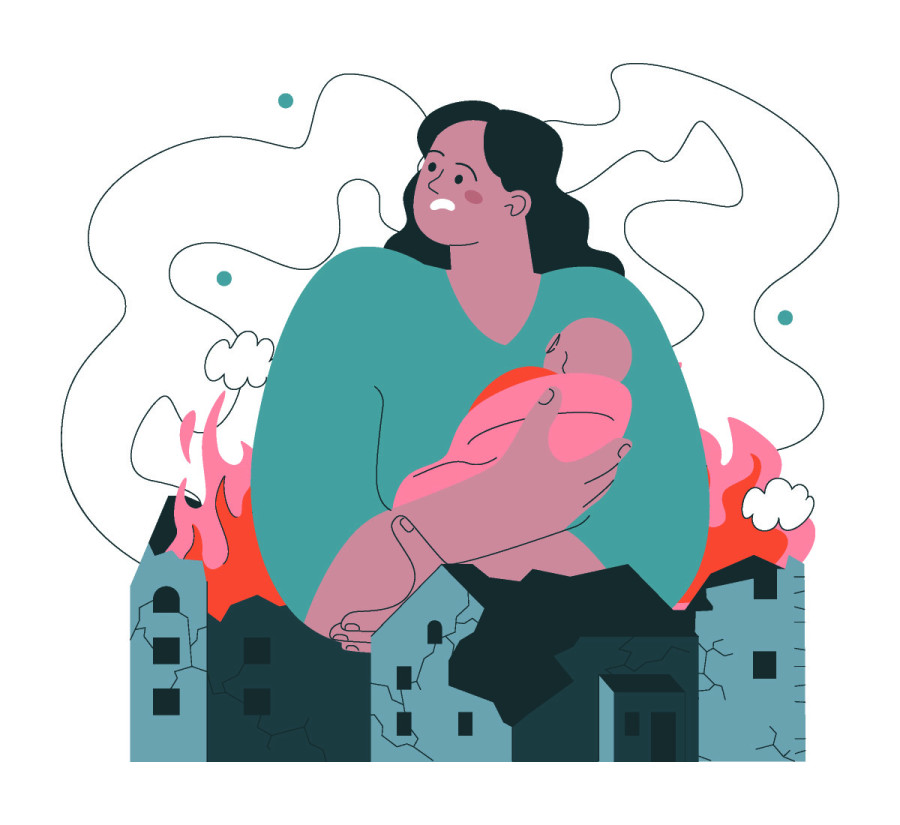Fiction Park
The forsaken child
“The police know about us,” Binod, an undercover journalist, whispered. “We need to leave this place immediately.”
Sandesh Parajuli
It was a rainy day, and Swikriti was a tender and innocent child on the brink of adolescence, not yet ready to weather the storms of life. For her, the rain was neither dramatic nor romantic. It was a mundane inconvenience, just another moment where roads get slippery and shoes get dirty.
The day of schooling had drawn to a close. With measured steps, Swikriti cautiously navigated the sodden terrain, finally arriving at her home. Standing before the entrance of a modest basement of an old, unplastered double-storey brick house, she heard two distinct sobbing sounds of women emanating from within. One of those sorrowful voices instantly resonated with her; it was her mother’s. Crossing the threshold into the living room, she found the women huddled closely on the bed, hastily feigning dry eyes. Meanwhile, an earnest-looking gentleman sat cross-legged upon a weathered, ash-coloured couch on the opposing side.
Her mother, Shanta Lama, rose slowly from the bed, her head drooping low, and made a mournful trudge towards the kitchen. Swikriti followed her. She strongly felt that something unsettling had taken hold of the environment.
Shanta gave Swikriti a long-sustained look as she handed her a packet of biscuits, her eyes drinking at the sight of her beloved child. But the flood of emotion immediately became too much to handle, and tears spilt from her eyes, cascading down her cheeks in an uncontainable outpour.
“What happened, mummy? Why are you crying?” asked Swikriti, herself weeping, as tears sprinkled in her eyes, too, glistening like morning dew.
“I had ten long years to prepare for this day, my child, but I wasted every second of it by loving you more and more,” Shanta whimpered and sat dejectedly on the floor.
Perplexed, Swikriti kneeled down and held her mother by her shoulder.
Drawn by a sudden wailing sound, she glanced at the living room.
The earnest-looking man had moved to the bed and was cajoling the other woman.
*
“Hey, Pushpaa. It’s me. Open the door,” Binod Shrestha hushed from outside and knocked on the door softly. Pushpaa let her husband in and immediately slammed the door shut.
The night was dark, and the air was filled with tension. Maoists had agreed to a second ceasefire with the government, but the police had exploited it as an opportunity to intensify the sting operation against the guerilla cadres. Every single night, sirens blared in the distance, their haunting wail echoing through the streets of Kathmandu, constantly making its residents feel as if danger was lurking just around the corner.
“I have some really unfortunate news. I think our life will change forever,” said Binod as he stood before the chipped sink and gazed intently at his reflection in the mirror.
“What are you talking about?” wondered Pushpaa.
“The police know about us. We need to leave this place immediately.” Binod moved towards his working table. He was an undercover journalist.
“Don’t we have a ceasefire? Peace talks are going on. Why are we worried?” asked the concerned Pushpaa.
“It is just a hoax, dear, the ceasefire. Under its guise, the government is tracking and hunting us down, using it as a pretext to execute our members without public acknowledgement. Therefore, it’s crucial that we quickly get underground and start strengthening our forces,” Binod said nervously as he collected papers from his study. “And, I guess you know what that means.”
Pushpaa shook her head.
Binod stepped towards Pushpaa, took hold of her arms, and fixed his unwavering gaze upon her. With a tone of earnestness, he said, “That means I’m uncertain if we’ll ever meet again.”
“What? Why?” questioned Pushpaa, her face flushed with worry.
“The party headquarter wants to deploy you to the southern plains of the country while I will be running errands on the eastern hills. We never know when a bullet shatters our heart.”
“Oh, dear!” Pushpaa exclaimed as she let out an anxious sigh. A rush of apprehension was clearly visible in her expression.
“And, what about our little child?” she inquired, her worry palpable, as she glanced towards the bed where a two-and-half-year-old Prakriti slept soundly, her innocent face relaxed and peaceful as if she was wrapped in a cocoon of warm, tranquil dreams, undisturbed by the worries of the waking world. “God, she is so sweet,” Pushpaa drew a deep breath and said, “and so unfortunate.”
“My dearest,” Binod lamented, “Even our kids are hesitant of sheltering a maoist’s child. I think we should find her a hostel.”
“Are you out of your mind? Putting a two and a half-year-old child in a hostel?”
“Remember, our daughter conquered the grim confines of Hanumandhoka jail at a tender nine months. Let us have faith. She will thrive in a hostel. She will grow into a resilient young lady.”
During the first ceasefire, the police had arrested Pushpaa and six other women on the charge of extortion, and the nine-month-old Prakriti had accompanied her mother to the prison, where she acquired severe pneumonia resulting in a life-long risk of asthma. The picture of mother-daughter in confinement was published in the national newspaper, causing a huge public outcry for prison improvement and inmate management.
“No. There should be a better option. I am still worried about her pneumonia,” Pushpaa said as she drew near the bedside and gazed at her daughter with tender affection and an air of melancholy resignation. “You were a mistake, my child,” her cheeks became awash with torrents of tears.
Binod held Pushpaa. She was a woman of great fortitude, but today he saw a different sight —a creature fraught with anxiety and despair. Perhaps, the anguish of impending maternal separation hd taken hold of her soul, leaving her feeling utterly helpless and shaken.
Binod stepped towards her and gave her a comforting embrace. “Remember why we chose to work for the party? We are on a mission, Pushpaa, and running out of time. Let’s first prepare to leave. We will bring Prakriti along with us, and we’ll find a solution tomorrow. Is that all right?” he asked.
Pushpaa gently wiped her tears and gave Binod an affirmative nod.
The couple then scrambled to gather their belongings. Gradually, desperation blanketed the room.
Suddenly, a knock reverberated through the room.
Their blood immediately turned cold. A shiver ran down their spines as they exchanged a wordless glance, wondering who could be at the door at these hours.
“Do we have a gun?” whispered Binod. Pushpaa signalled towards the bedside drawer. Her hands trembled as she slowly approached the door, her heart heavy with dread as she turned the doorknob; the hinges creaked as the door swung open with a groan. In the dim light, a shadowy figure loomed before her, the outline of a woman cast in menacing relief against the darkness.
“I will raise your child,” proclaimed Shanta Lama, the woman living next door with a six-year-old son, “You go fight for the people of this country!”
The couple gazed at each other in awe-struck silence as the patter of the raindrops outside the window serenaded the beating of two hearts as one.




 14.24°C Kathmandu
14.24°C Kathmandu










